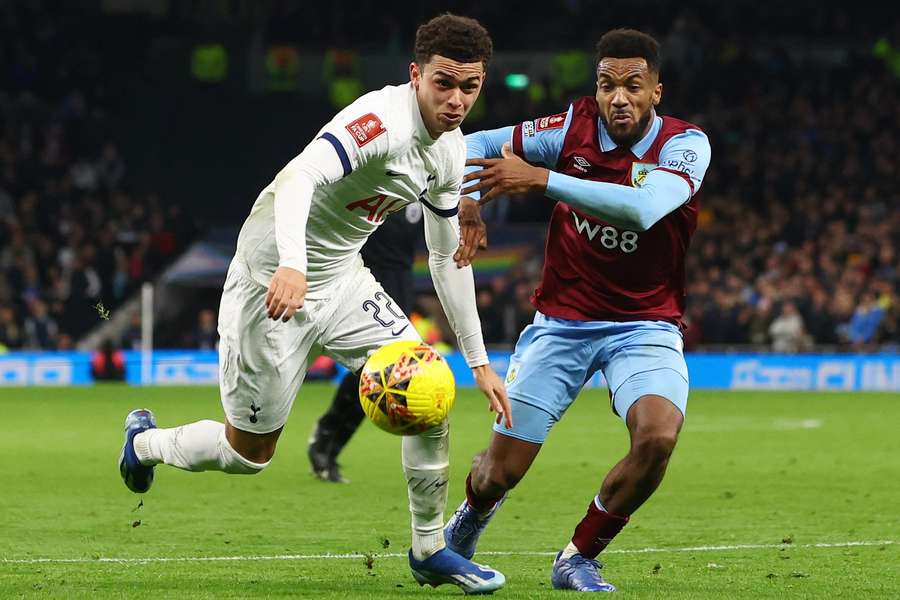It all stems, like much of the influence in football, from the Premier League. In this winter window, clubs have spent just 55 million pounds with Tottenham Hotspur leading the way with the 21-million-pound purchase of Radu Dragusin (21) from Genoa - a relative bargain given the age and profile of the player.
Manchester City are the only other club to have spent more than 10 million pounds - buying prospect Claudio Echeverri (18) from River Plate, where he will stay on loan for the rest of the season.
To put this into perspective, the last five of seven winter transfer windows have seen more than £200 million spent in the Premier League. Last year, £780 million was spent in January alone.
The Johnson factor
This lack of spending in the Premier League, especially from clubs lower down, is affected both by a nervousness to spend and an eagerness to reap as much benefit from sales as possible. The dynamics of this can be seen in the summer transfer of Brennan Johnson (23).
Johnson moved from Nottingham Forest to Tottenham Hotspur for around 60 million on Deadline Day in September, after Forest had held out for a higher value than they were offered at the start of the window. Being a homegrown player, any money made in the deal is labelled 'pure profit', giving Forest huge motivation to wait.
This is where the Premier League 'profit and sustainability rules' (PSR) come into play. According to these, clubs can make a loss of up to £133 million in a three-year cycle, with the current cut-off point for each year coming on June 30th. This is, of course, two months before the summer window closes and clubs cannot include any profit made in that window within their accounts for the previous year. This is the very reason Everton were given a 10-point deduction earlier this season and they could face more issues later this year - they are appealing the decision from January 31st.
There are obviously flaws to these rules and this is currently being looked at by the league, but for now, Forest, who spent big to stay in the Premier League upon their return after promotion in 2022 are looking over their shoulder at a potential points deduction, which could be cataclysmic to their chances of remaining in the league next year. All the more reason to maximise sales when they can to balance their books.
Added to this, clubs in a position to buy are looking at the valuation of homegrown players with scepticism as sellers aim to create as much financial freedom as possible, given the restrictions on losses imposed.
With this maelstrom of financial issues overshadowing clubs, those with tighter budgets are less likely to spend their way out of trouble as we saw last season.
Leeds spent more than 35 million pounds last January in transfers alone in their bid to survive, whilst Southampton acquired nearly 60 million pounds worth of new talent only to finish bottom of the pile come May.
These risks of spending big but falling flat have seen promoted sides Sheffield United, Luton Town and Burnley keep their powder mostly dry, acquiring a cumulative total of five players, most of these loans.
This strategy may not see them stay in the league, but it certainly won't do existential damage to their sides if they were to go back down.
This risk-shy play is being felt at the top of the league too. Free-spending Chelsea are open to offers for Conor Gallagher (23) due to his homegrown status - now known as the 'Johnson factor' - as they circle the drain of PSR.

What's more, clubs typically leave their business in the window late as they search for the best price for players in the mad scramble for signings, but this window doesn't feel like we will get many of these.
The knock-on effect
Due to the amount of cash in the Premier League, Europe's top leagues have always used the market to sell high to England and then buy in talent with that money. But, because so little has been spent by those sides, no serious cash has been spent on the continent either.
Bayern Munich have bought in Eric Dier (30) - unwanted at Spurs - on the cheap, whilst fellow Bundesliga big-hitters Borussia Dortmund have added just Jadon Sancho on loan in a deal with Manchester United that saw the Red Devils continue to pay a significant chunk of his wages.
The merry-go-round of deals has seen Genoa look likely to buy Vitinha (23) from Marseille with the Dragusin money, but even that is an initial loan deal with option-to-buy in the summer. The wariness to spend is being felt everywhere.
What about Saudi Arabia? They have been splashing the cash in recent windows, buying ageing or unwanted stars from Europe for inflated prices and therefore allowing those clubs more breathing room when it comes to financial fair play.
The biggest move in the Saudi Pro League so far this January? Renan Lodi (25) leaving Marseille for Al Hilal in a deal reportedly worth 23 million euros. Put that against the mega-deal for Cristiano Ronaldo (38) to Al Nassr - albeit on a free transfer - and you can see the difference.
The future of transfers
There are other external factors at play, too. The Asian Cup and the Africa Cup of Nations have hamstrung the market to some degree. Players away with their national side at tournaments tend to wait until they are back to move to another club side, but with both tournaments finishing after the window shuts, this leaves both parties short of opportunity.
Clubs with sound strategy tend to spend more in the summer, when coaches have more time to bed in new signings to their systems and structure, or new incoming coaches have time to target new signings to improve their side.
Despite both of these things, this season's lack of spending could be a trend that will continue. Or are we seeing an exception to what was the rule?
Given the pressures of leagues and competitions under financial stability regulations and the risk outweighing the reward - as seen in the punishments handed down to Everton and Nottingham Forest - it feels like this is something we should get used to.
If the Premier League remains the catalyst for player trading, then other clubs will have to find other ways to fund their teams. Focus on young talent will be paramount as will well-constructed contracts to maximise value, but the rules binding sides to proper and responsible spending could bring a sea-change to football in a way we haven't seen for more than two decades.




